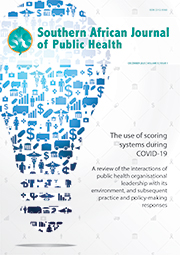Research

Smartphone addiction, selected psychological status and clinical variables among undergraduates in a Nigerian population
Abstract
Background. The use of smartphones in our current digital society has resulted in the development of musculoskeletal and emotional symptoms among undergraduates.
Objectives. To determine the correlations among smartphone addiction, selected psychological status and clinical variables among undergraduates in the College of Medicine, University of Lagos, Nigeria.
Methods. A cross-sectional survey was conducted among 837 undergraduates (500 females, 337 males). Questionnaires comprising a smartphone addiction scale, depression, stress and anxiety scale, neck disability index and shoulder pain disability index were used to collect self-report measures. Assessment of selected anthropometric variables (weight, height and body mass index (BMI)) was done. Pearson’s correlation coefficient and Spearman’s ρ were used to determine the correlation between variables at an α value of p<0.05.
Results. The outcome of this study revealed that more than half, 447 (53.4%), of the undergraduates were addicted to smartphone use. Eighty (9.6%) participants had severe depression, 155 (18.5%) had severe anxiety while 59 (7%) were severely stressed. It was observed that there was a significant relationship (p<0.05) but a weak correlation between smartphone addiction, psychological status, pain-related disability of neck and shoulder, BMI and weight.
Conclusion. Smartphone addiction is prevalent among undergraduates, and is correlated with their psychological status, selected anthropometric variables and pain-related disability of the neck and shoulder. It is recommended that undergraduates be enlightened on the impact of smartphone addiction on psychological health and the musculoskeletal system.
Authors' affiliations
A K Akodu, Department of Physiotherapy, College of Medicine, University of Lagos, Nigeria
Y A Adenekan, Department of Physiotherapy, College of Medicine, University of Lagos, Nigeria
R A Zibiri, Kaduna Polytechnic
Full Text
Cite this article
Article History
Date published: 2020-12-15
Article Views
Full text views: 1864

.jpg)


Comments on this article
*Read our policy for posting comments here